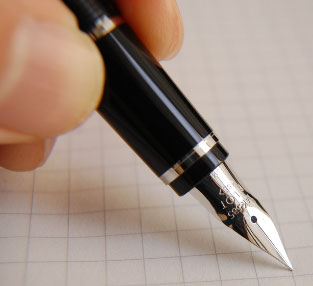The heart of any fountain pen is the nib. Fountain pen nibs evolved over time, with their origins in the reeds, quills, and styluses that were used until the wide use of metal nibs beginning in the 19th century.

Today’s high quality fountain pens are equipped with solid gold nibs, with 14k, 18k, and 21k being the most common. Other precious metals, such as palladium and titanium, are occasionally used as well. Less expensive pens are usually provided with a stainless steel nib, sometimes with gold or rhodium plating.
At PacificPenWorks, we specialize in fountain pens with solid gold nibs. Solid gold nibs are more durable and offer greater writing quality than steel nibs. Most importantly, solid gold fountain pen nibs are best suited to the complimentary nib tuning and optional nib customizations we provide.
Nib Tipping Sizes – How To Choose
Tipping sizes can range from Ultra Extra Fine to Extra Broad, with Extra Fine, Fine, Medium, and Broad being most common. Some pens come with only one tipping size choice, others with many more. Most Sailor pens, for instance, are provided with a range of seven different specialized tipping sizes.
Finer nibs are usually the best choice for everyday note-taking. Broader nibs offer the benefit of being even smoother on the page, and also provide the best starting points for our regrind-based customizations. Finer nibs in 14k, on the other hand, are the best choice for modifications to add Flex.
Specialized stock Stub and Italic nibs are sometimes provided by manufacturers, but tend to offer less line-width variation and be less user-friendly than the customizations produced by our own skilled nib specialists. These stock nibs, however, often provide an excellent starting point for those customizations – it is not at all unusual for a customer to order a stock Stub nib with our own customization for Stub added on!
“Exotic” stock nibs, such as triple-tined Music nibs and Sailor’s famous Nagahara nibs, can also be available. Keep in mind that nibs from Japanese manufacturers such as Platinum and Sailor run a size finer than their European counterparts. So a Sailor Fine nib will be the equivalent of a Pelikan Extra Fine, or a Platinum Broad equivalent to a Visconti Medium.
Karat Counts – 14k, 18k, and 21k
When it comes to karat count, higher purity alloys do not necessarily deliver more in terms of writing performance. In most cases, it is actually 14k solid gold nibs which are most highly valued by both fountain pen nib specialists and experienced users.
14k nibs, for instance, can be used for customizations providing for added Flex, including our Super-Fine Super-Flex customization. 18k and 21k nibs, on the other hand, can offer excellent starting points for regrind-based customizations, such as Stub and Cursive Italic. These regrind customizations are equally suited to 14k nibs as well.
14k, 18k, and 21k nibs can all provide an excellent writing experience. Even nib specialists and experienced users usually say that there is little difference in feel and performance between solid gold nibs in differing karat counts – tipping size, manufacturer, and proper nib tuning are far more important.
One possible exception to this rule are the 21k nibs from Sailor, one of our favorite brands. Some users feel that Sailor’s 21k nibs have a unique feel and smoothness different from all other nibs. But these are always subjective judgements – there are as many opinions about the best fountain pen nibs as there are fountain pen users!
Soft and Semi-Soft Nibs
Some 14k nibs are provided by manufacturers in versions already described as “flex” or “soft.” These stock soft nibs make excellent starting points for our own Flex and Super-Fine Super-Flex customizations. They can also be a great way to experiment with trying a soft nib if you’re not yet sure whether a soft or a rigid nib is the best choice for you.
It is important to know that soft and flexed nibs are actually less smooth-writing on the page than are standard rigid nibs. The same softness or flex that provides for greater line-width variation also causes the pen nib to glide less smoothly across the page.
Similarly, while a standard rigid nib provides the smoothest possible writing experience, adding a customization such as Cursive Italic or Left Oblique will also lessen smoothness in favor of line-width variation. There is always a trade-off between smoothness and line-width variation, whether through adding flex or through a regrind.
Making The Choice
When deciding among nib options, think about what you want to end up with on the page. If you’re looking for line-width variation and a more expressive and varied line, then choose a broader nib with one of our regrind customizations, or a finer 14k nib with a Flex modification. But if you’re just looking for the smoothest writing experience, a standard Fine or Medium with our complimentary nib tuning will often be your best choice.
Still have questions about fountain pen nibs? We’re always here to help. Just e-mail us at info@pacificpenworks.com. We’ll be looking forward to helping you…
